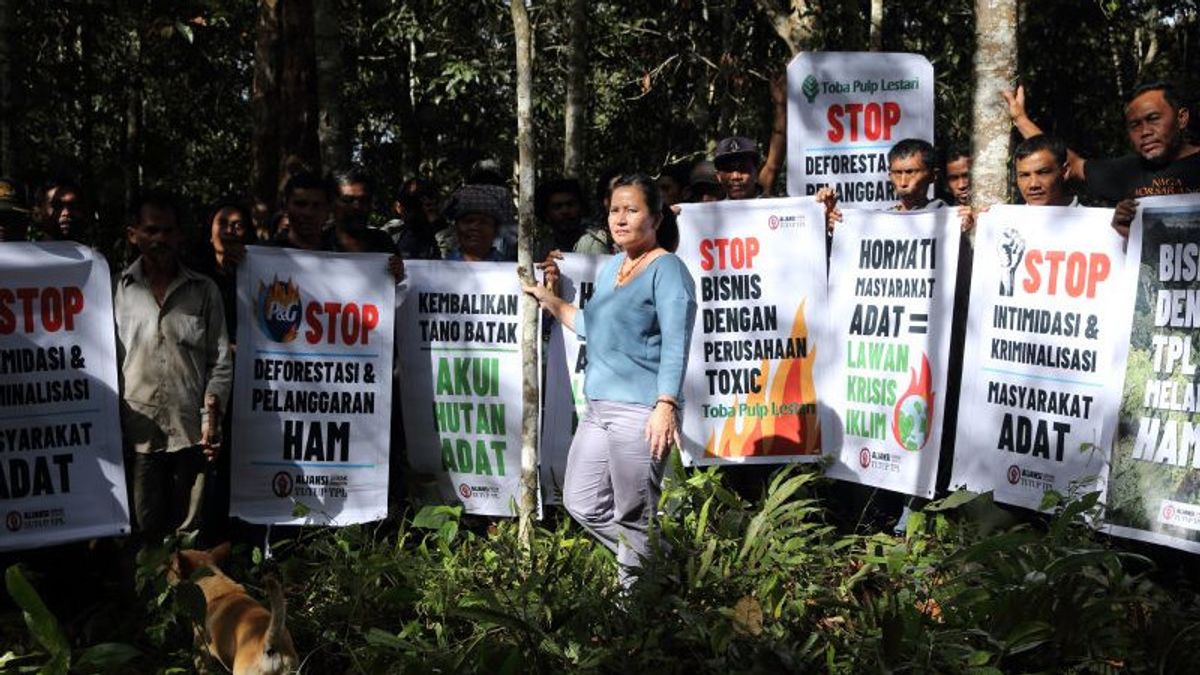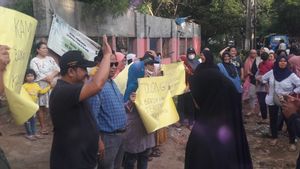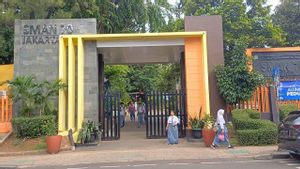JAKARTA - Delima Silalahi (47) still remembers clearly the incidents of forest destruction that occurred in his village in North Tapanuli and also the Lake Toba area, North Sumatra Province. Tropical forests damaged by the presence of the industry have caused environmental, social, and economic problems for local residents.
While studying, the Batak woman was an activist and joined the Community Prekarsa Study and Development Group (KSPPM) which is engaged in the protection of customary forests in North Sumatra, starting in 1999. Now he serves as executive director of the non-governmental organization.
"My childhood was in the village, I was in North Tapanuli. I saw the forests that when I was little were good, but in the last 30 years they have been increasingly destroyed," said Delima, who was interviewed by teleconference in Jakarta, in mid-April 2023.
Delima led the advocacy and campaign to obtain a legal management right of 7,213 hectares of tropical forest for six indigenous groups of people in North Sumatra.
He and six indigenous groups managed to reclaim the management rights of thousands of hectares of tropical forests from the hands of the company and are now starting to restore so that damaged forests can return to function to absorb carbon.
Previously, the pulp and paper company Toba Pulp Lestari (TPL) had turned part of the land into industrial plantation forests in the form of eukaliptus trees through a monoculture planting scheme. The eukaliptus is not a native plant from Tanah Batak.
Delima tells the story of a Goods tree or Styrax benzoin which becomes an endemic plant. Locals have cultivated Goods trees to meet their daily needs.
In fact, historical records show that the sap used in oil, fragrance, and treatment has been harvested and traded since at least the eighth century.
Dairy trees cultivated in the forest can be harvested continuously for 60 years. The sap has become a source of income for local residents.
For Batak indigenous peoples,ition has a deep meaning and is very important for their lives. In addition to functioning economically, sapuric also has the meaning of sociology and ecology.
Farmers there think leniency is a manifestation of women who give life to past generations, the present, and the future.
"As a manifestation of women, fire is a sacred plant and we know scientifically this is indeed an endemic plant that has grown in the Land of Batak, but since the company's presence (the Ministry of Agriculture) has been destroyed," said Delima as quoted by Antara.
Over the past few years, the company has penetrated forests in North Sumatra which have been managed traditionally by indigenous peoples. The company opens tropical forests rich in biodiversity into industrial plantation forests.
The company's presence raises various problems in the community, such as rivers that dry up during the dry season and flash floods during the rainy season.
KSPPM has recorded that since the last 10 years there have been around 12 ecological disasters that have occurred in Tanah Batak ranging from flash floods to landslides. The ecological disaster caused casualties and material casualties.
On June 16, 2013, a decade ago, the Constitutional Court read out a decision from the judicial review of Law Number 41 of 1999 concerning forestry submitted by the Alliance of Indigenous Peoples of the Archipelago (AMAN) and two indigenous communities.
The Constitutional Court through decision Number 35/PUU-X/2012 emphasized that customary forests are forests located in traditional areas and are no longer state forests.
The decision is an opportunity for Indonesian indigenous peoples to claim legal management of customary forest areas.
Delima Silalahi said the decision at the same time emphasized that the struggle of KSPPM and indigenous peoples who were encouraged to be concerned about the large confiscation of customary territory to be used as industrial plantation forests by pulp and paper companies was not an act against the constitution.
He is increasingly motivated to organize local residents to claim customary forests legally.
In June 2021, Delima and community members met with the Minister of Environment and Forestry Siti Nurbaya Bakar to urge recognition of the indigenous forest belonging to the community.
Seven months later, in February 2022, the government finally granted legal management rights of 7,213 hectares of customary forest to six indigenous community groups (including 6,333 hectares of land claimed to return from Toba Pulp Lestari and 884 hectares of the country's forest area).
Currently, the six indigenous groups are slowly starting to plant land with native tree species, including reformation activities. The activity aims to increase tree cover and natural climate resistance because they believeCE can only grow and stretch if the trees are protected by other protective plants, which number in the dozens of sticks.
Through fire, it is an effort to restore traditional traditions and culture of indigenous peoples so that they can re-emerge the forest.
There is a clear division of roles between women and men in the indigenous community that has been organized for a long time.
Men in the realm of their work in the forest, one of which is collecting sap. Meanwhile, women work in the village to manage fields, fields, livestock, and households.
However, since the shady trees that grow in tropical forests were destroyed, men have lost their living space, work, and professions. This condition interferes with the harmony between the family and the quality of their lives, so that many men are afraid to go home because they have no more work.
The success of Delima with indigenous community groups in obtaining management rights of 7,213 hectares of forest legally becomes a victory for climate resilience, biodiversity, and the rights of indigenous peoples.
The persistence of Delima Silalahi in advocating and fighting for the rights of indigenous peoples in the Land of Batak earned him an award from The Goldman Environmental Prize.
The Goldman Award, which began in 1989, is a prestigious award to environmental activists at the grassroots level.
The award winners were selected by an international jury from several nominations proposed in secret by an international network consisting of organizations and individuals engaged in the environmental sector.
Goldman's award is celebrated in a live ceremony held at Opera House, San Fransico, United States, on April 24, 2023, at 05.30 PM EDT or April 25, 2023, at 07.30 WIB. Then, the second ceremony will be held at the Eisenhower Theater located at John F. Kennedy Center for the Performing Art, Washington DC, United States, on April 26, 2023, at 07.00 PM EDT.
Delima said the award was an extraordinary appreciation from the international community who appreciated the work at the site level of indigenous peoples.
He is well aware that this is not an award for himself personally. This is an award for the movement of indigenous peoples in Tanah Batak and Indonesia in general.
As an environmental activist who has struggled for 24 years, he admits that he has never been in the shadow to become a hero or to get an award. The principle of is beauty from KSPPM is always embedded in his mind.
Delima advised environmental activists to always be enthusiastic in fighting even though various intimidations arise. Advocacy activities and campaigns related to forest protection are not unlawful struggles, so there is no need to be afraid of threats that come.
He hopes that more people will be involved in environmental movements and the movement of indigenous peoples in Indonesia and also countries around the world.
Moreover, now humanity is facing the huge challenges of climate change, making forest protection activity very important for planet Earth.
Caring for, managing, and fighting for the existence of forests is one way to mitigate climate change, which now has a more real impact, ranging from global warming, the emergence of various diseases, to extreme weather.
Lastary greetings!
The English, Chinese, Japanese, Arabic, and French versions are automatically generated by the AI. So there may still be inaccuracies in translating, please always see Indonesian as our main language. (system supported by DigitalSiber.id)








